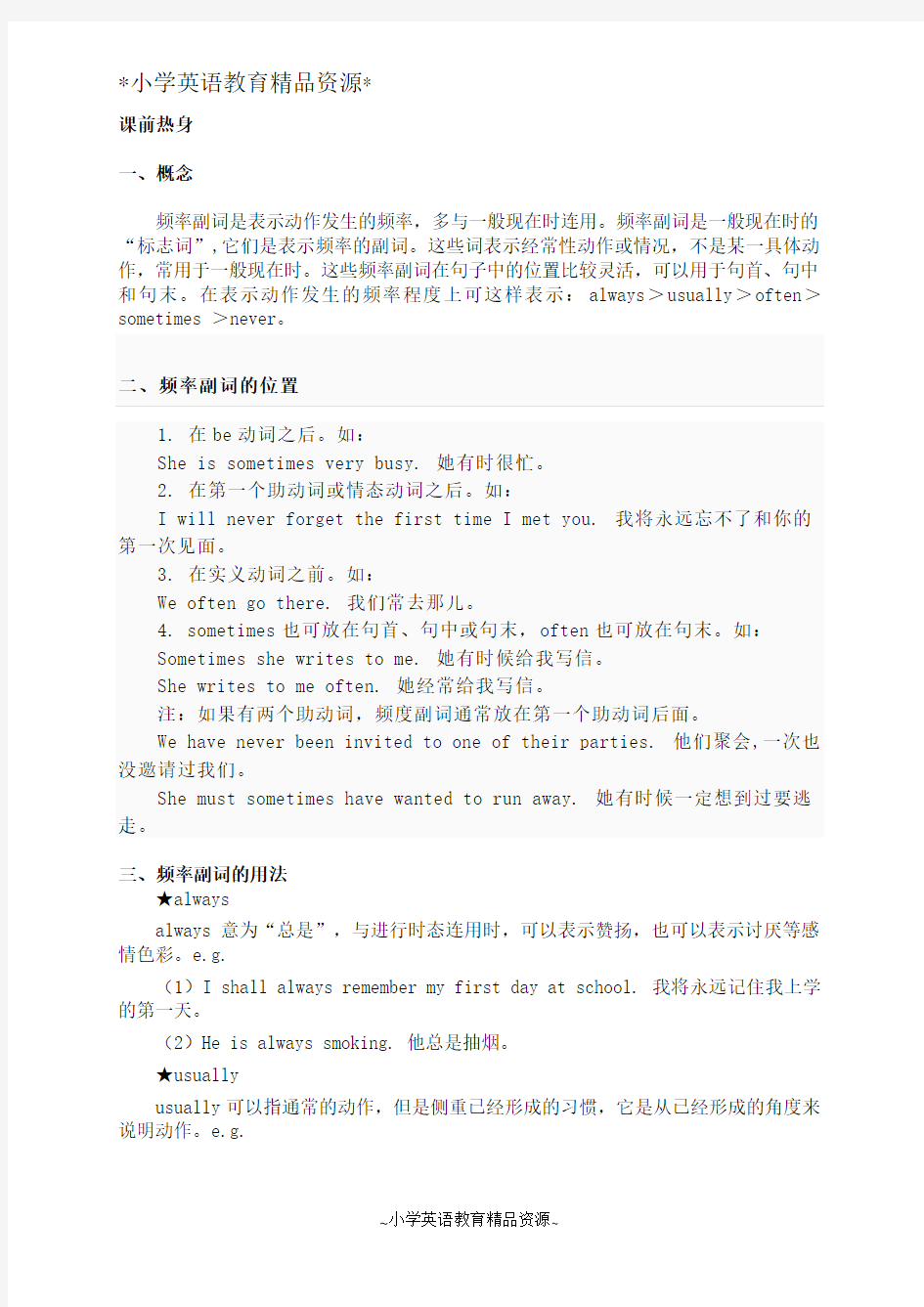广州版五年级上册英语教案 频率副词


课前热身
一、概念
频率副词是表示动作发生的频率,多与一般现在时连用。频率副词是一般现在时的“标志词”,它们是表示频率的副词。这些词表示经常性动作或情况,不是某一具体动作,常用于一般现在时。这些频率副词在句子中的位置比较灵活,可以用于句首、句中和句末。在表示动作发生的频率程度上可这样表示:always>usually>often>sometimes >never。
二、频率副词的位置
1. 在be动词之后。如:
She is sometimes very busy. 她有时很忙。
2. 在第一个助动词或情态动词之后。如:
I will never forget the first time I met you. 我将永远忘不了和你的第一次见面。
3. 在实义动词之前。如:
We often go there. 我们常去那儿。
4. sometimes也可放在句首、句中或句末,often也可放在句末。如:
Sometimes she writes to me. 她有时候给我写信。
She writes to me often. 她经常给我写信。
注:如果有两个助动词,频度副词通常放在第一个助动词后面。
We have never been invited to one of their parties. 他们聚会,一次也没邀请过我们。
She must sometimes have wanted to run away. 她有时候一定想到过要逃走。
三、频率副词的用法
★always
always 意为“总是”,与进行时态连用时,可以表示赞扬,也可以表示讨厌等感情色彩。e.g.
(1)I shall always remember my first day at school. 我将永远记住我上学的第一天。
(2)He is always smoking. 他总是抽烟。
★usually
usually可以指通常的动作,但是侧重已经形成的习惯,它是从已经形成的角度来说明动作。e.g.
(1)I usually do some shopping with my parents on Sundays. 我经常在星期天和我的父母一起去买东西。
(2)He usually goes to school by bike. 他通常骑自行车上学。
★often
often是指经常性的动作,意思为“常常, 经常”。e.g.
(1)Children don't often do homework. 孩子们经常不写作业。
(2)He is often late for school. 他经常上学迟到。
★sometimes
sometimes意思为“有时,不时”,表示次数较少(低于often所表达的次数),常常与一般现在时或一般过去时连用。e.g.
(1)Sometimes he goes to work by bike, and sometimes he goes by bus.
有时候他骑自行车上班,有时候他乘公共汽车上班。
(2)Sometimes I helped my parents in the house. 有时候我帮助父母做家务。
★hardly
hardly意思为“难得, 几乎从来不”,它所表示的次数非常少。e.g.
(1)He hardly drinks. 他几乎不喝酒。
(2)She hardly plays cards. 她几乎不打牌。
★never
never意思为“决不, 从未”,表示一次也没有。e.g.
(1)He never lives there. 他从来都没有在那儿住过。
(2)She never has anything to do. 她一向无所事事。
模糊频率副词
以下些词都是表示事情发生频率的副词,也是不准确地说某事在一段间内发生的次数。
always 总是usually 通常often 经常
sometimes 有时hardly ever 几乎never 从来不
例如:
On weekends I always surf the Internet.
I usually watch TV.
I often sleep late.
I sometimes listen to music.
I hardly ever play computer games.
I never play soccer.
我们按照频率发生的高低,可以将这几个词排列为
always > usually > often > sometimes > hardly ever > never。
请看下面的图解:
always usually often sometimes never
100% 70—80% 60-70% 30-40% 0
精确的频率副词
以下这些频率副词可以准确地表达事情发生的频率。
一次 once 两次 twice 三次 three times
四次 four times 五次 five times 六次 six times
注意:在记忆时,我们只要记住once(一次)和twice(二次)就可以了。其他发生次数只要用“数字+times”来表达就可以了。
例如:
I drink milk and eat vegetables every day.
我每天喝牛奶,吃疏菜。
I exercise once a week.
我每周锻炼一次。
I eat McDonald’s twice a month.
我一个月吃两次麦当劳。
I visit my grandmother four times a year.
我一年去看奶奶四次。
其他的表达法:
every day 每天once a week 一周一次 twice a month 一个月
两次
four times a year 一年四次once two weeks 两周一次t wice three months 三个月
两次
巩固知识
频率副词表示与次数,频率有关的副词。我们所学习的频率副词有:()_________、()_________、()_ ________、()_________、()_________。另外表示次数的有()_________、()_________。
频率副词的使用:
① It is usually hot in summer. 夏天通常很热。
总结:频率副词放在_________的后面。
② My father usually goes to work by bus. 我爸爸总是坐公共汽车去上班。
总结:频率副词放在_________的前面。
③Tony doesn’t often eat vegetable.他不经常吃青菜。
总结:频率副词放在_________和_________之间。
频率副词位置记忆口诀:be后,动前,助动间。
趁热打铁练一练:
一、请把括号中的频率副词放到句中适当的位置。
1. She is a good student.(always)
___________________________________________________
2. My mother is late for school.(never)
___________________________________________________
3. We play in the playgound.(often)
___________________________________________________
4. Mike goes to the park.(sometimes)
___________________________________________________
5. He doesn’t get up at six o’clock..(usually)
___________________________________________________
二、补全句子。
1.托尼一直喜欢生日聚会。Tony ______ ______ birthday parties.
2.我们通常给他送一张生日卡片。We ______ ______ ______ a birthday card.
3.他从来不玩电脑游戏。He ______ ______ computer games.
4.她从未去听音乐会。She ______ ______ to a concert.
5.我妹妹经常买唱片。My sister ______ ______ CDs. 9
三、单项选择。
1.Kate can’t swim,so she ______swims. A. always https://www.wendangku.net/doc/e410359807.html,ually
C.never
2.Does your brother ______shopping on Sunday? A.always goes B.always
go C.go always
3.Jim often______football on TV. A.watches B.watch C.watchs
4.Her clothes______always beautiful. A.is B.am C.are
5.My mother______goes to the cinema. A.doesn’t B.don’t
C.never
Module 9重点练习:
1.The camel comes from ______. A.African and Asian B. African and Asia
C. Africa and Asia
2.Does Huizhou ______a zoo?A.has B.have C. having
3.______the kangaroo from Australia? A.Does B.Do C.Is
4.There are ______50 monkeys in this zoo. A.about B.has C.have
5.People should stay ______. A.health B.good C.healthy
6. The camels are always in the______. A.jungle B.desert
C.grassland
7.The panda ______meat. A.don’t eat B.doesn’t eat C.isn’
t eat
课外练习:
一.将下列句子改为肯定的陈述句
1. He doesn’t come from Zhejiang.__________________________________________________
2. He doesn’t have lunch at school. _________________________________________________
3. Are there any birds in the tree? ___________________________________________________
4. I don’t have any brothers or sisters. ________________________________________________
5. Can she arrive at the airport on time? _______________________________________________
二.将下列句子改为否定陈述句
1. He does his homework at 6 in the evening. ________________________________________________
2. Li Lei has his dinner in the restaurant everyday. ___________________________________________
3.There are some koalas in the zoo. _______________________________________________________
4. I can speak some French. _____________________________________________________________
5. Lucy has a brother and a sisiter. ________________________________________________________
三.将下列句子变成一般疑问句
1. I am a doctor. __________________________________________________________
2. Lucy and Lily are from America. ______________________________________________________
3. He walks to school everyday. _________________________________________________________
4. Little Tom can speak a little Chinese. ___________________________________________________
5. They will have an English party tomorrow. ______________________________________________
6. The children are playing games there. __________________________________________________
7. They have 4 classes in the morning. ____________________________________________________
8. The Greens went to England last week. _________________________________________________
9. He spent his vacation on the beach. ____________________________________________________
10. I have to stay at home all day. __________________________________________ 实义动词;eat,run.drink.look.listen.等
情态动词can could will would shall should may might must need ought 助动词do does did done
Be动词am is are was were been
